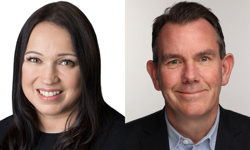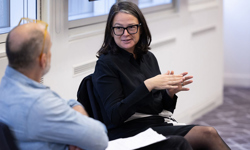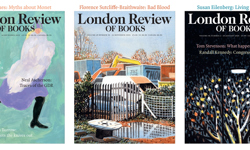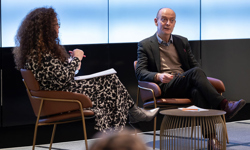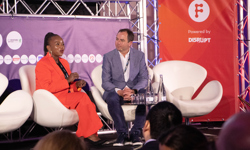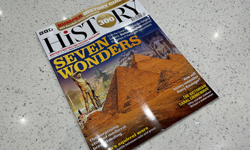The future will be 300 words long
I was chairing a session during Social Media Week recently when Malcolm Coles of Trinity Mirror Digital said they had found that the optimum length for a piece online was three hundred words. People would read pieces that were considerably longer if they happened to be interested in the subject but for the casual browser, three hundred words was about right.
This makes sense. It would take you two minutes to say three hundreds words aloud, which is about as long as most people are capable of concentrating on the average speaker. Lincoln’s address at Gettysburg was two hundred seventy words long, which really ought to give your conference windbags pause. Written down, three hundred words is three paragraphs of a hundred words each, which probably build up to one interesting thought or story. All stories obey the law of three, the first being set-up, the second being jeopardy, the third being resolution. Like movies, plays and pop songs, they generally have three acts or verses.
There’s a further reason why three hundred words works and it particularly applies in online. It works because, with three hundred words, a reader can glimpse the end of the piece at the same time as he can see the beginning. Therefore he knows how much of his time this piece is going to take up. People may or may not be reading as much as they used to in the days of ink and paper but one thing they are certainly doing is scanning, before they either read or move on without reading. In that instant of scanning they are sizing up the job. Therefore the first thing you have to do is give them some idea of the task in hand. You shouldn’t need a word-count. Three hundred words is, if you like, a screen-full.
Words of Wisdom
I was in Sheffield to hand out the prizes to students taking part in the Magazine Academy awards and to pass on about three hundred words worth of advice.
I tried to impress on them two things. One, please don’t believe that your employer, if you have one, has the first clue where the business is going to go next or any interest in providing you with a career plan through it. Take hold of your own future for yourself if you know what’s good for you. On the same tip (I know how these students talk) I urged them to follow the money. This is the sort of thing nobody ever says to students, who are reputed to respond to appeals to idealism, but it’s something that should be said. In planning your career, aim at the areas of the market where people, readers, advertisers or sponsors, are spending money and position yourself close to the point where the money enters the business. That’s where you’ll have the most fun and have the least chance of starving. Don’t waste your time waiting for the world to beat a path to your door because likely as not it won’t.
Having passed on this wisdom, I unwound in the company of a senior newspaper-man who was about to retire after many years spent passing on his trade to students. He bemoaned the fact that when students asked him how they should learn to write, they didn’t take seriously his advice that they should read P.G. Wodehouse. Ah, a man after my own heart. Wherever two old typewriter clackers are gathered together, you will hear something similar. Ignore the surfaces, the aunts and pigs and stately homes. It’s the machinery that counts. Wodehouse was the supreme technician of the English language. Me and my new friend stood there swapping old lines like senior members of the Drones, noting in particular how the great man always made sure the funny bit was at the end of the sentence. As in the following:
“Honoria, you see, is one of those robust, dynamic girls with the muscles of a welterweight and a laugh like a squadron of cavalry charging over a tin bridge.”
Smash Hits Forever!
My old friend and colleague Barry McIlheney, CEO of the PPA, spends his life standing up and delivering three hundred words of “remarks” at all kinds of functions. He tells me he can always be guaranteed to get a warm reception when he mentions the fact he was once the editor of Smash Hits. I’ve found the same thing. Former Smash Hits readers are legion; they turn up in the most surprising places and they never forget. Barry tells me that Sajid Javid, the Culture Secretary, is a former reader. This weekend, I was buttonholed by a senior figure at BBC Radio Three who assured me that our efforts to get the lyrics of Depeche Mode records absolutely correct back in the day were always appreciated. It’s so funny to meet these figures with their impeccable gravitas in middle age and to try to connect them to the people who used to get out their Friends Forever notepaper and their multi coloured biros and painstakingly write longhand letters asking for the address of the Eurythmics fan club or whether we could confirm that this or that pop star had a life-threatening illness. Of course, when I meet them now, they’ve got kids of their own, they’re every bit as devoted to the Great British Bake Off as they once were to Duran Duran and they no longer get up on Sunday afternoon just in time for the Chart Show. You never would have believed it. Smash Hits Nation used to be obsessed with Culture Club. Now they’re obsessed with cycling and cake.
The Search for Enlightenment
At Radio Three’s Free Thinking Festival in Newcastle, I found myself having dinner between Andrey Kurkov, the celebrated Ukrainian writer, and Kenneth Cukier, the man the Economist task with interpreting the world of Big Data for the rest of us. They made an interesting pair. We asked Kurkov whether things were likely to get better in Ukraine and he managed to stop himself from looking at us as if we were children and said he didn’t think they were. Putin has been in power for fifteen years now, he doesn’t show any sign of giving up and he depends for his continued power on convincing Russia that the world is against them. The more we’re against them, the more that policy works for him.
Kenneth, I think it’s fair to say, is a little more optimistic about his field, feeling that Big Data is going to change our world in ways we find it difficult to imagine. For instance, in the area of medical care, Big Data’s instant analysis of probabilities will make us less dependent on the intervention of a particular doctor, much as our access to all kinds of information makes us less dependent on the traditional information providers.
Two different views of the world, then, but both men, who were widely travelled and published in many languages, were agreed on one thing. They had never seen anything like the stag and hen parties which were wending their way past the restaurant window in Newcastle that Saturday night. I recommended they should both seek further enlightenment in the pages of Viz.




